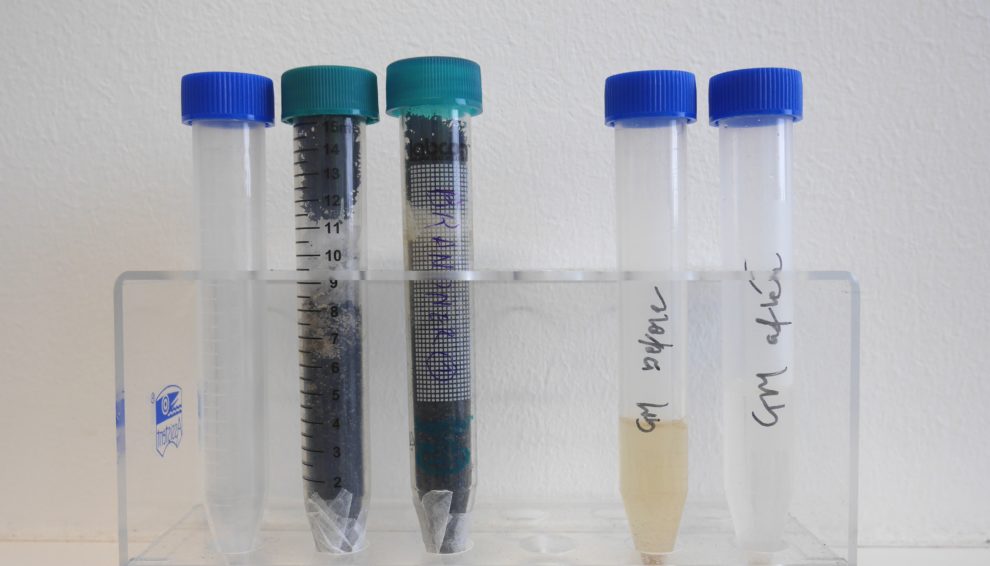
30.10.2018

Estonia’s trademark is often considered to be its pristine nature. However, the key question about this would be clean water – how do you clean industrial wastewater in such a way that it would not damage the nature or seep into the groundwater?
Professor Erwan Rauwel and doctor Protima Rauwel, a French couple working in the Estonian University of Life Sciences, have developed an innovative filter based on nanotechnology. It is so cheap and effective that it is able to filter out heavy metal ions, radioactive elements and even pharmaceutical residues, while retaining the beneficial minerals like magnesium, calcium and potassium that are essential to good quality water.
“Right now, the best solution for cleaning the water is technology based on reverse osmosis, which takes every single element out of the water, including the good ones. The issue with this method, however, is that it takes an incredibly high toll on the environment – in a hundred years, only 5% of the reverse osmosis filter will decay in the nature,” says Erwan to explain the benefits of the innovative filter.
Although Estonia has plenty of water and there is no fear of losing our drinkable water, Protima has a more global example. „Of all the water on Earth, freshwater only makes up 2,5% of it. 1,5%, i.e. over a half of this, is found in glaciers, which are already melting and mixing with seawater. This leaves us with 1% freshwater which include ground water and surface water, which is not much at all. For example, right now pollution is such a big issue in Mexico that the life expectancy of people is merely 40–50 years, children are not developing appropriately for their age and people get sick very often. All of these troubles come from lack of clean water.”
Water pollution is mainly caused by human activities, e.g. industry, intensive agriculture and poor waste management. “Mining pollutes roughly 100 000 tonnes of water per year, but it is cheaper to pay the pollution tax instead of just cleaning the water,” adds Erwan as an example.
The filter itself uses a straightforward working principle – it consists of 99% sand and 1% nanoparticles, which will trap heavy metal ions, radioactive elements and even degrade pharmaceutical residues. One gram of nanoparticles can bind up to two grams of pollution, which is significantly better than what can be achieved by similar filters being used right now.
By now, the joint company of Protima and Erwan – PRO-1 NANOSolutions – has found its first Estonian industrial co-operation. The co-operations aim is to treat a ship’s wastewater so thoroughly that it could be discharged into the sea without any concerns. Protima explains, “For example, when you clean the engine, you get a viscous fluid, thick with chemicals. From this fluid, as much solid waste is extracted from this as possible. The rest of the liquid waste will go through our filter after it has been treated with other methods. Our filter is at the end of the line as the difficulty is fine tuning the waste water to the present day EU norms. Our filter is able to do that”. Erwan demonstrates two test tubes, one of them containing the ship’s wastewater, the other – treated water. I smell them. Indeed, the first, slightly yellow tube has a strong smell of chemical (similar to fuel) to it, whereas the other one looks like entirely ordinary water.
“Sustainability goes hand-in-hand with socio-economic effects and water has an essential role to play in this. If we exhaust our natural resources, the economic success will not do any good for us. We have to figure out how to give Earth back everything that we have stolen from it in recent times,” thinks Protima. Erwan adds, “The Earth has had to pay a high price for our actions. If we continue to exhaust natural resources to win the first prize in the race, then we should also pay for our part in this.”
Webpage: PRO-1 NANOSolutions
Photo: Arengukoostöö Ümarlaud
Clean, accessible water for all is an essential part of the world we want to live in and there is sufficient fresh water on the planet to achieve this. However, due to bad economics or poor infrastructure, millions of people including children die every year from diseases associated with inadequate water supply, sanitation and hygiene.
Water scarcity, poor water quality and inadequate sanitation negatively impact food security, livelihood choices and educational opportunities for poor families across the world. At the current time, more than 2 billion people are living with the risk of reduced access to freshwater resources and by 2050, at least one in four people is likely to live in a country affected by chronic or recurring shortages of fresh water. Drought in specific afflicts some of the world’s poorest countries, worsening hunger and malnutrition. Fortunately, there has been great progress made in the past decade regarding drinking sources and sanitation, whereby over 90% of the world’s population now has access to improved sources of drinking water.
The Sustainable Development Goals are the blueprint to achieve a better and more sustainable future for all.
Read more about SDG 6 – Clean Water and Sanitation
This publication has been produced with the financial support from the Nordic Council of Ministers. The content of this publication is the sole responsibility of the coordinators of this project and do not necessarily reflect the views or policies of the Nordic Council of Ministers.
Kommentaarid